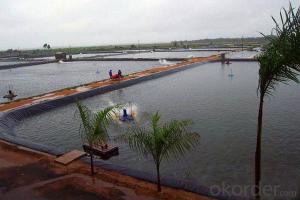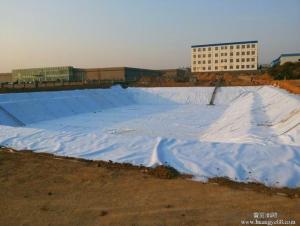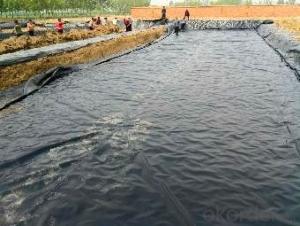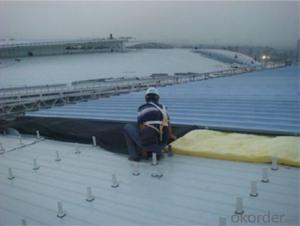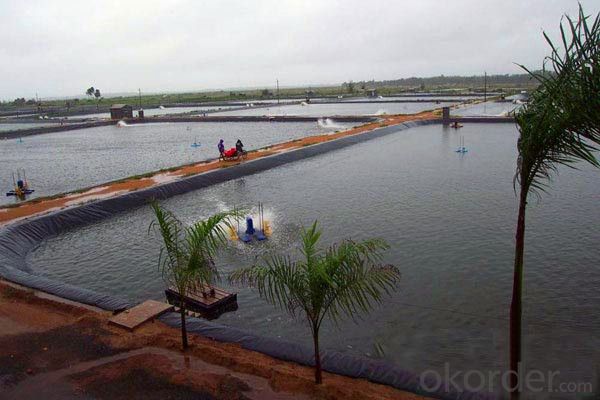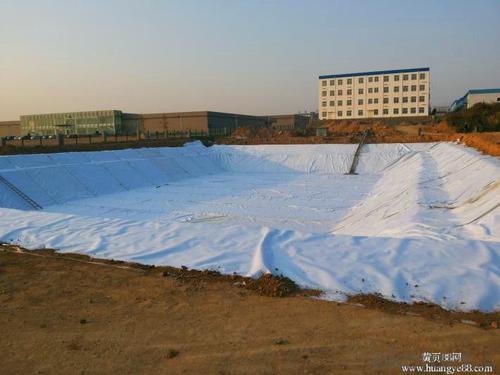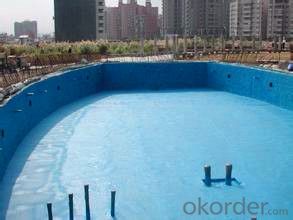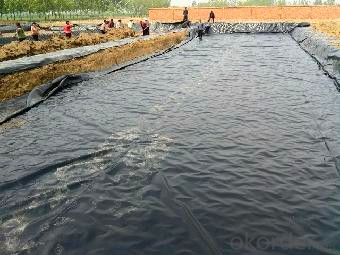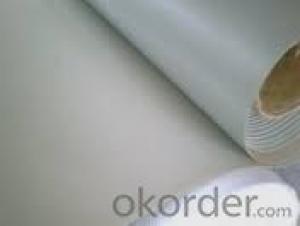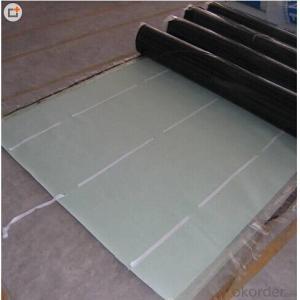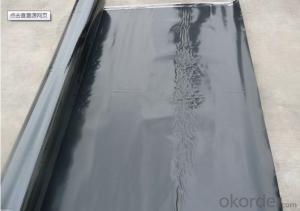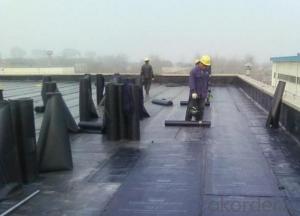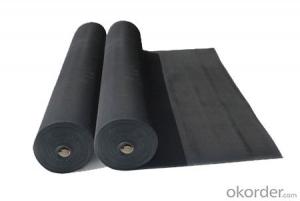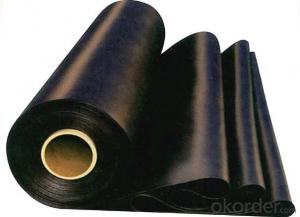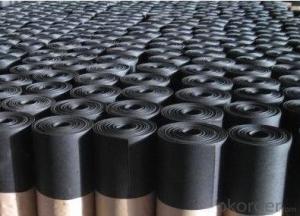High Elastomeric EPDM Rubber underground Waterproof Membrane
- Loading Port:
- Qingdao
- Payment Terms:
- TT OR LC
- Min Order Qty:
- 10000 m²
- Supply Capability:
- 5000000 m²/month
OKorder Service Pledge
OKorder Financial Service
You Might Also Like
Description Of EPDM Rubber Waterproof Membrane:
1. EPDM Rubber Waterproof Membrane uses the technology of internationally advanced level-cold feed extruder continuous vulcanization, chooses imported epdm and accessories with high quality. The production is of well quality according to the national standards.This product has the high elasticity and high elongation and high tear strength and excellent low temperature performance and water resistance, ozone resistance, aging resistance performance .
Main Features of EPDM Rubber Waterproof Membrane:
1 Excellent physical and mechanical performance
2 High tearing resistance
3 Good deformation adaptability
4 High puncture resistance
5 High aging resistance
6 High UV resistance
Specifications of EPDM Rubber Waterproof Membrane:
Type | EPDM Rubber Waterproof Membrane | |||
Material | EPDM Rubber | |||
Thickness | 1.0mm | 1.2mm | 1.5mm | 2.0mm |
Size | 1.2m(width) * 20m(length)/roll | |||
Type | Vulcanized | |||
Pattern | Non-reinforced(homogeneous) | |||
Packing | 24sqm--80sqm/roll, with plastic bag | |||
Color | Black | |||
Application | Roofs, basement, pond, Lake, steel structure roof, swimming pool, underground, tunnel, etc | |||
Applications of EPDM Rubber Waterproof Membrane:
1 Roofs, Basement, Toilet
2 Industrial and civil building waterproofing
3 Geosynthetic liner for swimming pool, channels, irrigation system
4 Especially suit for projects with high requirements in durability, anti-corrosion and deformation
IMages of EPDM Rubber Waterproof Membrane:
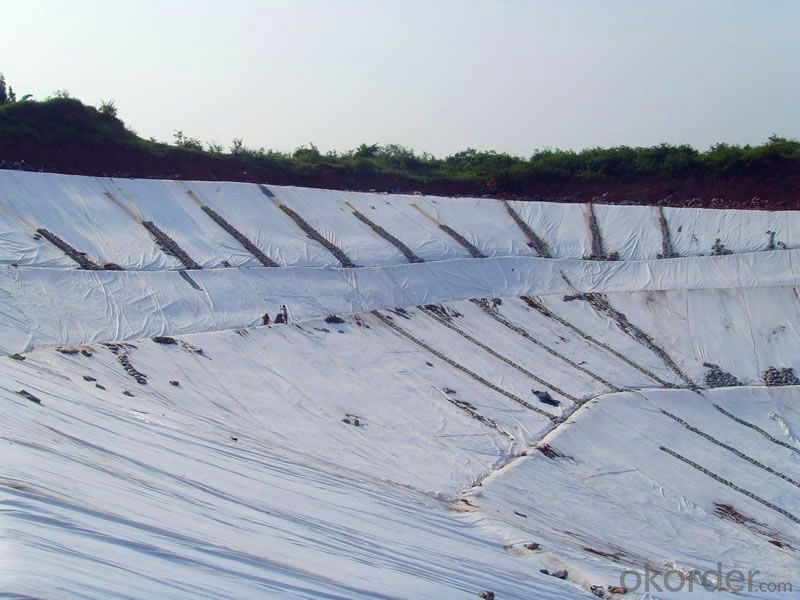
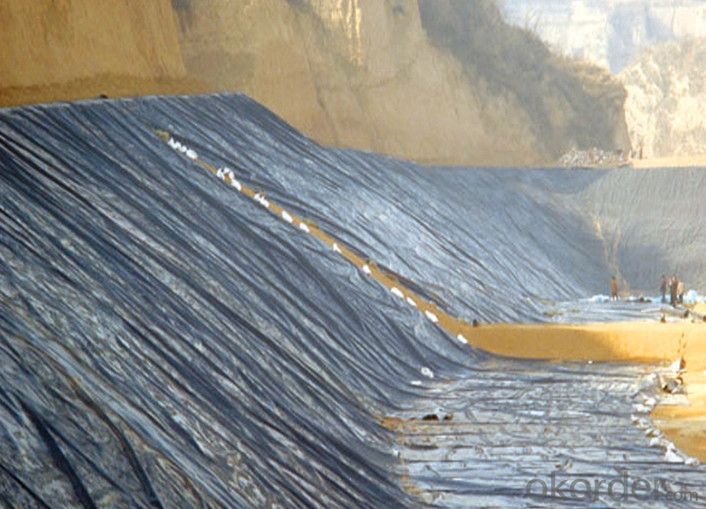
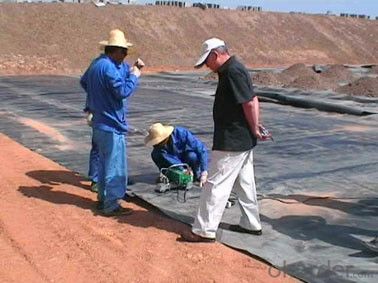
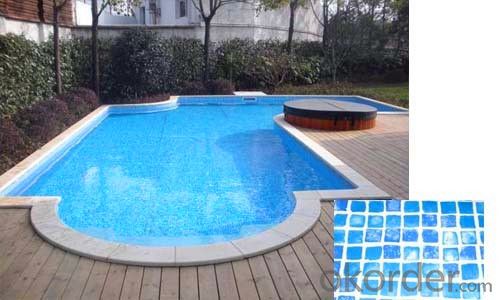
FAQ:
Q1.:What are we supplying?
A1:We are specialized in producing Colorful Asphalt Roof Shingle, SBS/APP modified bitumen waterproof membrane, Self adhesive bitumen waterproof membrane, PVC waterproofing membrane, EPDM rubber roofing membrane, Single Component Polyurethane Waterproof Coating, and Spray Polyurea Waterproof Coating
.
Q2: How Many years experience do we have?
A2:We have exported to more than 20 countries in the last 15 years.
Q3.:Do you provide samples for us?
A3:Yes,We will provide samples for free.Waiting for your your good news.
- Q: Can a waterproofing membrane be used on exterior walls?
- Yes, a waterproofing membrane can be used on exterior walls. It is commonly used to prevent moisture penetration and protect the building envelope from water damage.
- Q: Can a waterproofing membrane be used in temporary or temporary structures?
- Yes, a waterproofing membrane can be used in temporary or temporary structures. Waterproofing membranes are designed to provide a protective barrier against water penetration, which is essential in preventing moisture damage in any type of building structure. Whether it is a permanent or temporary structure, such as a temporary shelter, tent, or temporary construction site, a waterproofing membrane can be applied to ensure water resistance and protection. It is important to choose a waterproofing membrane that is suitable for the specific needs of the temporary structure and follow proper installation guidelines to ensure its effectiveness.
- Q: Can a waterproofing membrane be used for an industrial facility?
- Yes, a waterproofing membrane can be used for an industrial facility. It provides a protective barrier against water intrusion, preventing potential damage and ensuring the integrity of the facility's structure.
- Q: Does a waterproofing membrane require any specialized tools or equipment for installation?
- Yes, the installation of a waterproofing membrane typically requires specialized tools and equipment. Some of the common tools and equipment used for installation include a trowel or roller for spreading the membrane, a utility knife for cutting and shaping the membrane, a heat gun or propane torch for activating and adhering the membrane, a seam roller for ensuring proper bonding of seams, and a caulking gun for applying sealant around penetrations and edges. Additionally, depending on the specific type of waterproofing membrane being installed, other tools such as a primer, bonding adhesive, or specialized membrane fasteners may be required. It is important to consult the manufacturer's installation guidelines to ensure the proper tools and equipment are used for a successful installation.
- Q: Can waterproofing membranes be used on swimming pool decks?
- Yes, waterproofing membranes can be used on swimming pool decks to protect them from water damage and leaks.
- Q: Can a waterproofing membrane be used for shower installations?
- Indeed, for shower installations, it is advisable to employ a waterproofing membrane to avert water intrusion into the walls, floors, or any susceptible areas that may result in harm. A waterproofing membrane serves as a shield, prohibiting water infiltration into the nearby regions. This is especially crucial in showers where water is incessantly utilized and splattered. By implementing a waterproofing membrane, you guarantee that your shower area remains impervious to water and safeguarded against any possible water-related destruction.
- Q: Can waterproofing membranes be used on parking decks?
- Yes, waterproofing membranes can be used on parking decks. Parking decks are exposed to various weather conditions and are subject to constant vehicle traffic, which can lead to water penetration and damage. Waterproofing membranes provide a protective barrier against water infiltration, preventing moisture from seeping into the structure and causing deterioration. These membranes are designed to withstand heavy loads and resist the chemicals found in automotive fluids, making them an ideal solution for parking decks. By applying waterproofing membranes, the lifespan of the parking deck can be extended, reducing the need for costly repairs and ensuring the safety and integrity of the structure.
- Q: Can a waterproofing membrane be used on precast metal surfaces?
- Yes, a waterproofing membrane can be used on precast metal surfaces. Waterproofing membranes are designed to provide a protective layer that prevents water penetration and can be applied to various types of surfaces, including precast metal. These membranes are typically composed of materials such as bitumen, liquid-applied coatings, or synthetic rubber, which create a barrier against water and moisture. By applying a waterproofing membrane to precast metal surfaces, it can help to prevent corrosion, protect against water damage, and enhance the durability and longevity of the metal structure. However, it is important to ensure that the chosen waterproofing membrane is compatible with the specific type of precast metal surface and that proper surface preparation and application techniques are followed to ensure optimal performance.
- Q: Can a waterproofing membrane be used for pond or pool applications?
- Certainly! A waterproofing membrane is suitable for both pond and pool applications. Its main purpose is to create a barrier that prevents water from penetrating, making it an excellent choice for sealing ponds and pools. These membranes are typically made from synthetic materials like PVC, EPDM, or TPO, all of which have high resistance to water and UV rays. They come in different thicknesses and can be tailored to fit the specific dimensions of the pond or pool. Moreover, waterproofing membranes are incredibly durable and flexible, allowing them to withstand continuous exposure to water and the movement of the underlying substrate. In summary, utilizing a waterproofing membrane for pond or pool applications helps avoid leaks, extends the lifespan of the structure, and guarantees a safe and enjoyable water environment.
- Q: What is called a waterproof roll dry shop, wet shop
- Wet laying method is to use cement or mortar as a base binder, the step is to pour the cement slurry on the grass, and then side of the shop while driving the mud to go.
Send your message to us
High Elastomeric EPDM Rubber underground Waterproof Membrane
- Loading Port:
- Qingdao
- Payment Terms:
- TT OR LC
- Min Order Qty:
- 10000 m²
- Supply Capability:
- 5000000 m²/month
OKorder Service Pledge
OKorder Financial Service
Similar products
Hot products
Hot Searches
Related keywords
